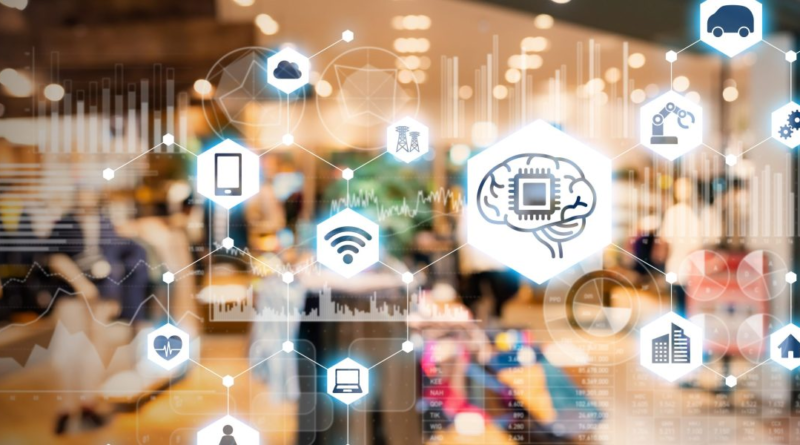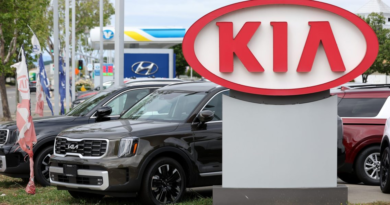The future of retail is the intersection of digitalization and sustainability
Retailers worldwide, especially traditional ones, are facing two major headwinds: digitalization and sustainability. It’s crucial for every retail CEO to prioritize these trends not only as challenges but also as opportunities to be taken on together as drivers of growth.
When digitalization and sustainability come together, we call it green digitalization, and its applications show the way forward for the future of retail. Green digitalization is about addressing retail challenges smartly and sustainably, creating a cycle that drives future growth. Through this approach, retailers can enhance their stores, engage customers, optimize supply chains, promote sustainability, and encourage responsible consumption.
Transforming retail for a sustainable future
Traditional retailers face tough competition from tech-savvy rivals. McKinsey warns that retail margins have shrunk by 2% to 3% annually, even up to 5% to 6% in some cases, from 2017 to 2022. Omnichannel retailers often outperform traditional ones. Online sales grew by 12% in mature categories in 2021, surpassing offline sales by 1.4 times, and new categories surged by 6%, seven times faster than offline.
Meanwhile, digital leaders enjoyed 5% yearly sales growth from 2014 to 2022, outperforming digital followers (+2.6%) and digital latecomers (-0.4%), according to Retail Economics. These trends will accelerate as digital natives become the primary retail spenders. Retailers not adapting are at risk.
Meanwhile, the retail sector, with its massive size and extensive supply chain, bears substantial responsibility for environmental and social issues. The production, transportation, and disposal of retail goods significantly impacts the climate, air, water, and the environment. Recent research by Normative shows that the retail sector contributes to roughly 25% of global greenhouse gas (GHG) emissions. The production, transportation, and disposal of retail goods have significant impact on climate, air, water, and the natural environment. Most of retail’s carbon footprint stems from its extended supply chain, with Scope 3 emissions accounting for over 90% of total GHG emissions, as estimated by the British Retail Consortium.
With these trends converging, traditional retailers must become more digital and more green, and the development of new technology—especially the Artificial Intelligence of Things (AIoT)—allows for retailers to apply solutions that can achieve both.
AIoT and the value of green digitalization
IoT (Internet of Things) in retail involves the deployment of interconnected devices and sensors throughout stores, warehouses, and logistics networks. This provides retailers with real-time data on customer behavior, store operations, and supply-chain management. AI is then used to analyze this data and extract new insights that can lead to more informed and timely business decisions, creating a sustainable and continually improving retail environment.
AIoT can be utilized in numerous retail scenarios, including waste reduction, inventory management, logistics optimization, and facility management. By leveraging these technologies, retailers can enhance their operational efficiency, improve customer experiences, and drive revenue growth. Grocers lose an average of $70 million a year to perishable food spoilage alone, causing significant income erosion.
In order to safeguard perishable goods, guarantee optimum freshness, and minimize waste, environmental sensors can be used in cold chains to monitor ambient conditions such as temperature, humidity, air quality, light intensity, and other environmental factors inside a storage facility, cargo container, delivery vehicle, or store. IoT sensors in supply chains ensure efficient deliveries and quality control, minimizing waste and environmental impact.
AIoT sensors can manage store energy use by controlling lighting and temperature, promoting energy conservation. Managers want to keep operating costs low, and IoT sensors allow them to remotely monitor who is in the building as well as equipment and resource use. Smart buildings enable them to configure the HVAC system, lighting, and other infrastructure to react automatically as people come and go. This keeps employees and customers comfortable, preventing wasteful power consumption and reducing reliance on manual adjustments.
Retailers should expect to see even more innovative applications and widespread adoptions in the industry.
Embracing comprehensive digital transformation strategy
In this evolving landscape, technology company Hanshow’s approach—incorporating smart pricing and payment, media and marketing, and ecosystem and energy management system optimization—is pivotal. By focusing on advanced payment systems and dynamic pricing, Hanshow enhances transaction efficiency and profitability.
Smart marketing strategies leverage AI for targeted retail media campaigns, ensuring a personalized customer journey. The emphasis on energy solutions reflects Hanshow’s commitment to sustainability and operational efficiency. This holistic strategy places Hanshow at the forefront of retail innovation, synergizing growth with environmental and societal consciousness.
Sustainable tech is responsible tech, and vice versa
The European Union has set a target to reduce GHG emissions by 55% by 2030. Three-quarters of Generation Z said sustainability is more important than brand when making a purchase decision. Failure to address these issues will put businesses at risk of losing customers and employees, facing regulatory fines, disappointing investors, and damaging reputation, which in turn will hurt financial performance.
Notably, an NYU Stern Center for Sustainable Business analysis of over 1,000 studies published since 2015 shows that strong corporate management of environmental and social governance is positively correlated with improved stock price performance.
Michelle Liang is chief technology officer of Hanshow Technology. Hanshow is a partner of Fortune’s Brainstorm AI.




